初中英语动名词和动词不定式归纳
初中英语动词不定式和动名词归纳
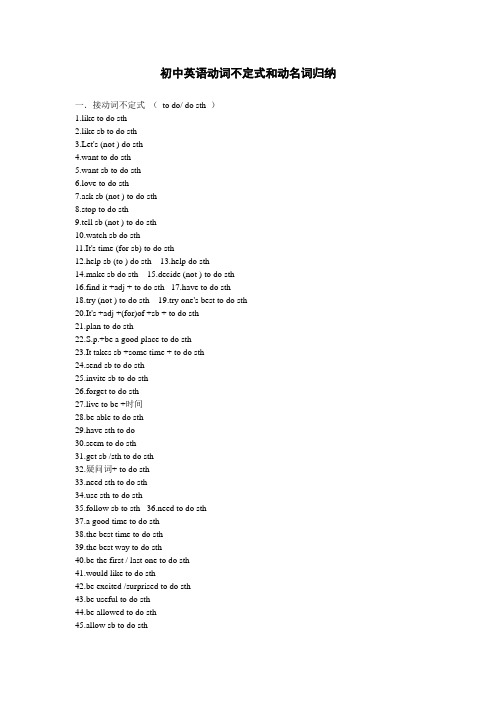
初中英语动词不定式和动名词归纳一.接动词不定式(to do/ do sth )1.like to do sth2.like sb to do sth3.Let's (not ) do sth4.want to do sth5.want sb to do sth6.love to do sth7.ask sb (not ) to do sth8.stop to do sth9.tell sb (not ) to do sth10.watch sb do sth11.It's time (for sb) to do sth12.help sb (to ) do sth 13.help do sth14.make sb do sth 15.decide (not ) to do sth16.find it +adj + to do sth 17.have to do sth18.try (not ) to do sth 19.try one's best to do sth20.It's +adj +(for)of +sb + to do sth21.plan to do sth22.S.p.+be a good place to do sth23.It takes sb +some time + to do sth24.send sb to do sth25.invite sb to do sth26.forget to do sth27.live to be +时间28.be able to do sth29.have sth to do30.seem to do sth31.get sb /sth to do sth32.疑问词+ to do sth33.need sth to do sthe sth to do sth35.follow sb to sth 36.need to do sth37.a good time to do sth38.the best time to do sth39.the best way to do sth40.be the first / last one to do sth41.would like to do sth42.be excited /surprised to do sth43.be useful to do sth44.be allowed to do sth45.allow sb to do sth46.It's better to do sth47.It's best to do sth48.take care (not) to do sth49.see sb do sth 50.why not do sth ?51.have enough time to do sth52.too… to do sth53.not… enough to do sth54.encourage sb to do sth55.choose to sth56.wait to do sth57.be happy/glad/pleased to do sth58.make it +adj + to do sth59.be careful to do sth60.be afraid to do sth61.It's our duty to do sthed to do sth63.can't afford to do sth64.make a decision to do sth65.have an opportunity to do sth66.wait for sb to do sth67.would do sth rather than do sth68.would rather do sth than do sth69.hurry to do sth70.refuse to do sth71.agree to do sth72.pretend to do sth73.pretend to be doing sth74.prefer to do sth75.prefer not to do sth76.prefer to do sth raher than do sth77.be willing to do sth78.volunteer +时间/ 钱+ to do sth79.volunteer to do sth80.offer to do sth 81.rush to do sth82.in order (not ) to do sth 83.be certain to do sth84.be sure to do sth 85.make plans to do sth86.go out of their way to do sth87.lead sb to do sth 88.It's one's job to do sth 89.It's one's turn to do sth90.urge sb to do sth91.Could /Would you please (not) do sth ?92.be supposed to do sth93.warn sb to do sth二、接动名词(doing sth )1.like doing sth3.have fun doing sth4.be interested in doing sth5.Thanks for doing sth6.look at sb doing sth7.stop sb doing sth8.stop sb from doing sth9.go + v-ing10.do the (some )+v-ing11.What/How doing sth ?12.practice doing sth13.watch sb doing sth14.find sb doing sth15.mind (one's ) doing sth16.can't stand doing sth17.think about doing sth18.spend … (in)doing sth19.finish doing sth20.be busy doing sth21.keep doing sth22.keep sb from doing sth23.keep sb doing sth24.be good at doing sth25.hate doing sth26.There be +名词+doing sth27.make a living by doing sth28.have a difficult time doing sth29.feel like doing sth30.allow doing sth31.see sb doing sth32.by doing sth33.end up doing sth34.do a survey about doing sth35.be afraid of doing sth36.be used to doing sth37.be terrified of doing sth38.give up doing sth39.instead of doing sth40.have nothing against doing sth41.be serious about doing sth42.have a chance of doing sth43.before/ when /while +doing sth44.start doing sth45.have a lot of experience doing sth47.consider doing sth48.dream of / about doing sth49.continue doing sth 50.put off doing sth51.be used for doing sth =be used to do sth52.prefer doing sth to doing sth53.without doing sth54.be comfortable doing sth55.can't stop/help doing sth56.look forward to doing sth57.be against doing sth58.have trouble/problems/difficulty (in) doing sth59.suggest doing sth60.be busy doing sth61.be worth doing sth后接动名词的固定搭配aim at目的在于,旨在;瞄准accuse...of...控告;谴责depend on取决于devote to奉献,致力engage in从事于,忙着;订婚feel like欲,想要go on继续;发生cannot/couldn t help禁不住;不得不insist on坚持keep from使……不(做)keep on继续不断,保持look forward to盼望,期待persist in坚持,持续prevent from预防,防止put off推迟,推延set about开始,着手succeed in成功thank for感谢think of想起,想到;想一想1.只能跟to do作宾语的动词afford,agree,arrange,choose,claim,demand,deserve,decide,expect,fail,hurry,hope,manage,offer,pla n,prepare,promise,pretend,refuse,wish,threaten,2.只能跟doing作宾语的动词acknowledge,admit,advocate,appreciate,avoid,consider,contemplate,complete,consider,delay,deny, dislike,enjoy,escape,excuse,evade,fancy,finish,imagine,involve,mind,miss,practise,prevent,risk,res ist,resent,repent,suggest,can't help情不自禁, burst out突然爆发,give up放弃, get through完成, put off推迟,keep on doing 持续can't stand doing3.常见的动词+介词to后跟doing 做宾语be used to doing习惯于,add to doing加上,devote to doing献身于,lead to doing导致于,get to doing开始,come to doing谈到,look forward to doing期待,stick to doing坚持be sentenced to doing宣判,object to doing抗议,4.常见的动词+形容词+介词of后跟doing做宾语be fond of doing, be afraid of doing, be tired of doing,5.动词+其他介词后跟doing 做宾语insist on doing, prevent from doing,spend in (on)doing, be interested in doing6.有些动词后面可以跟to do作宾语,也可以跟doing 作宾语,A、含义不同remember to do记住去做remenber doing记得做过regret to do遗憾的做regret doing懊悔作了forget to do忘记去做forget doing忘记做过try to do努力去做try doing试试去做help to do帮助做can't help doing禁不住need to do主动需要need doing需要被做want to do主观想要want doing需要被做stop to do停下去做(目的状语)stop doing停止做go on to do接着做go on doing继续做B、差别细微doing表抽象一般, to do表具体就要发生like doing like to dolove doing love to dohate doing hate to doprefer doing prefer to doC、无差别start,begin.continue,intend,cease.1. -ing 分词修饰人或类人时,用来表示人正在发生的动作,不需重读,解释为someone who is doing2. -ing 分词修饰物或类物时,用来表示此物的用途或特征,需要重读,解释为something which is used to do。
动词的不定式与动名词的区别

动词的不定式与动名词的区别动词的不定式(infinitive)和动名词(gerund)是英语中两种常见的非谓语动词形式。
尽管在形式上它们有一些相似之处,但在用法和含义上有明显的区别。
本文将详细介绍动词的不定式和动名词的区别,以便读者更好地理解和运用它们。
一、形式上的区别1. 动词的不定式通常由“to + 动词原形”构成,例如:to learn,to eat,to go等。
2. 动名词则是在动词原形后面直接加上-ing,例如:learning,eating,going等。
二、用法上的区别1. 主语的区别:a) 不定式作为主语:不定式一般用作主语时,表示一种抽象的行为、概念或目的。
例如:- To learn a new language is challenging.(学一门新语言很有挑战性。
)b) 动名词作为主语:动名词用作主语时,表示一种具体的、实际的行为或活动。
例如:- Reading helps expand your vocabulary.(阅读有助于扩大你的词汇量。
)2. 宾语的区别:a) 不定式作为宾语:不定式可以作为及物动词或不及物动词的宾语,常用于某些动词后,例如:want,hope,decide等。
例如: - She wants to learn Chinese.(她想学中文。
)b) 动名词作为宾语:动名词一般用作及物动词的宾语,常用于某些动词后,例如:enjoy,like,dislike等。
例如:- He enjoys swimming in the ocean.(他喜欢在海里游泳。
)3. 表语的区别:a) 不定式作为表语:不定式可以用作表语,通常用于表示完成、未来或可能性等。
例如:- His dream is to become a doctor.(他的梦想是成为一名医生。
)b) 动名词作为表语:动名词不常用作表语。
4. 定语的区别:a) 不定式作为定语:不定式可以用作修饰名词或代词的定语,常用于表示目的、原因或解释等。
初中语法 动词不定式和动名词的用法
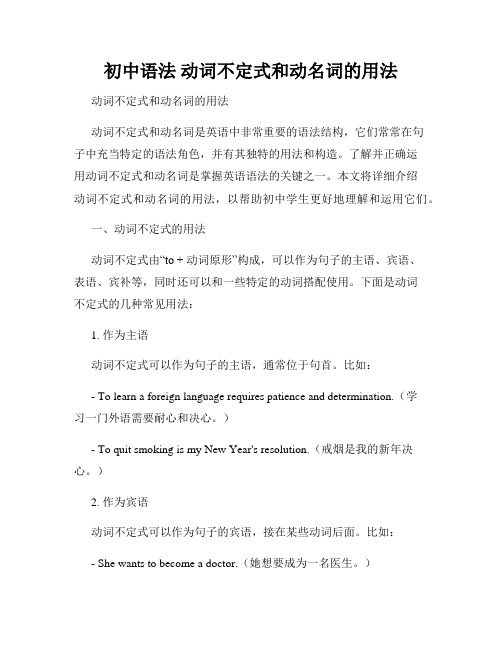
初中语法动词不定式和动名词的用法动词不定式和动名词的用法动词不定式和动名词是英语中非常重要的语法结构,它们常常在句子中充当特定的语法角色,并有其独特的用法和构造。
了解并正确运用动词不定式和动名词是掌握英语语法的关键之一。
本文将详细介绍动词不定式和动名词的用法,以帮助初中学生更好地理解和运用它们。
一、动词不定式的用法动词不定式由“to + 动词原形”构成,可以作为句子的主语、宾语、表语、宾补等,同时还可以和一些特定的动词搭配使用。
下面是动词不定式的几种常见用法:1. 作为主语动词不定式可以作为句子的主语,通常位于句首。
比如:- To learn a foreign language requires patience and determination.(学习一门外语需要耐心和决心。
)- To quit smoking is my New Year's resolution.(戒烟是我的新年决心。
)2. 作为宾语动词不定式可以作为句子的宾语,接在某些动词后面。
比如:- She wants to become a doctor.(她想要成为一名医生。
)- He enjoys playing basketball.(他喜欢打篮球。
)3. 作为表语动词不定式可以作为句子的表语,通常与be动词连用。
比如:- His dream is to travel around the world.(他的梦想是周游世界。
)- The most important thing is to believe in yourself.(最重要的事情是相信自己。
)4. 作为宾补某些动词后面可以接动词不定式作为宾补,表示动作的目的、结果或意图。
比如:- He wants to buy a new car.(他想要买一辆新车。
)- I need to finish my homework before dinner.(我需要在晚餐前完成我的作业。
初中英语动名词和动词不定式归纳

初中英语动名词和动词不定式归纳1.一些动词只能加doing,如___。
有些动词加doing和to do意义相同,如begin doing/begin to do,而有些动词加doing和to do意义不同,如thank you for doing sth和___。
2.一些动词加doing和to do意义不同,如___表示感谢某人,而___表示起初或开始。
其他动词如keep/go (on)/continue doing、can’t help doing、can’t stand doing、can’t。
doing sth、feel like doing、go +doing、no +doing、be worth doing、bebusy doing sth、spend time/money (in) doing、waste time/money (in) doing、consider doing sth、___) doing、used to do、be/get used for doing sth、be/get used to doing、pay n to doing、holdon to doing sth、look forward to doing等也有不同的用法和意义。
3.为了避免格式错误,需要注意段落之间的空行和标点符号的正确使用。
同时,删除明显有问题的段落,如没有任何意义或与主题无关的段落。
对于其他段落,可以适当改写,使其更加流畅和易懂。
___When we are interested in doing something。
we are more likely to put in the effort to do it well。
Doing well in something means we are good at it。
and we take pride in our abilities。
初中英语知识点归纳动词的不定式和动名词用法总结

初中英语知识点归纳动词的不定式和动名词用法总结动词的不定式和动名词是英语学习中的重要知识点,它们的用法十分多样且常见。
本文将对动词的不定式和动名词的用法进行总结和归纳。
一、动词不定式1. 作主语:例句:To succeed in life is his ultimate goal.成功是他追求的终极目标。
2. 作宾语:a. 接及物动词的宾语:例句:I want to learn English.我想学英语。
b. 接不及物动词的宾语:例句:She decided to go hiking.她决定去徒步旅行。
3. 作表语:例句:Her dream is to become a doctor.她的梦想是成为一名医生。
4. 作补语:a. 表示命令、建议、请求等:例句:She told me to wait for her at the gate.她告诉我在门口等她。
b. 表示目的、目标等:例句:He went to the store to buy some groceries.他去商店买一些杂货。
5. 作定语:例句:We need a person to help us with the project.我们需要一个人来帮助我们完成这个项目。
6. 作状语:a. 表示目的、结果、原因等:例句:He studied hard to pass the exam.他努力学习为了通过考试。
b. 表示时间、条件等:例句:I woke up early to catch the bus.我早起为了赶公交车。
二、动名词1. 作主语:例句:Swimming is my favorite sport.游泳是我最喜欢的运动。
2. 作宾语:例句:I enjoy reading books in my free time.我喜欢在空闲时间读书。
3. 作表语:例句:Her hobby is dancing.她的爱好是跳舞。
4. 作补语:例句:His job is teaching English.他的工作是教英语。
初中英语动词不定式及动名词总结

初中英语动词不定式及动名词总结初中英语动词不定式及动名词总结(八年级)一、后跟动词不定式结构1.agree to do XXX同意做…2.decide to do XXX决定做…3.hope to do sth希望…4.need to do sth需要…5.offer to do sth主动…6.plan to do sth计划…7.can’t wait to do迫不及待…8.continue to do sth继续…9.try (one’s best) to do尽力…ed to do sth过去常常…11.feel lucky to do XXX做某事很幸运12.ask sb to do sth叫某人做13.want(sb)to do sth想要(某人)…XXX鼓励某人做…15.allow sb to do sth允许某人做…16.XXX提醒某人做…17.send sb to do sth派某人做…18.It’s +形+for sb +to do XXX做某事对或人来讲怎么样19.It XXX sb some time to do sth做某事破费或人多长工夫20.too+形+to do太…而不克不及…21.XXX do充足…能够做…22.不定式能够作表语My job\dream is to do23.不定式能够作定语a good way\place to do sth做某事的好方法24.不定式能够表目的To get good grades。
I must study hard2、后跟动名词方式1.consider doing sth考虑2.XXX喜爱3.XXX XXX做完某事4.mind doing sth介意5.keep doing sth一直keep on doing sth继续|坚持6.can’t。
doing sth停不下来7.can’t。
help doing sth不由得8.put off doing sth推迟9.give up XXX摒弃10.ba busy doing sth忙于11.have a good time doing XXX做某事很开心12.have XXX做某事很困那13.how \what about doing sth…怎么样14.XXX成功做15.XXX感谢做16.be XXX对做某事感乐趣be afraid of doing sth害怕be good at doing sth善于于XXX对做…自豪be used to doing sth惯于17.sb spend some time (in) doing sth18.XXX三.即可加to do又可加ing,但意思差别大XXX do XXX忘记要做某事(事情还未做)XXX遗忘做过某事(工作已做)XXX记得要做某事(事情还未做)XXX记得做过某事(事情已做)try to do XXX尽力去做某事XXX尝试做某事to do XXX停下了去做某事XXX停止做某事used to do XXX过去常常做某事be used to doing sth气于做某事四.后跟动词原型make sb do XXX使某人做某事let sb do XXX让某人做某事help sb (to) do sth帮助或人做某had better do XXX最好做某事五.便可跟原型,又可跟ingsee sb do XXX看见某人做了某事(事情已发生)XXX瞥见或人正在做某事(工作正在产生)hear sb do XXX听见或人…了(工作已产生)。
初中英语知识点归纳动名词和不定式的用法
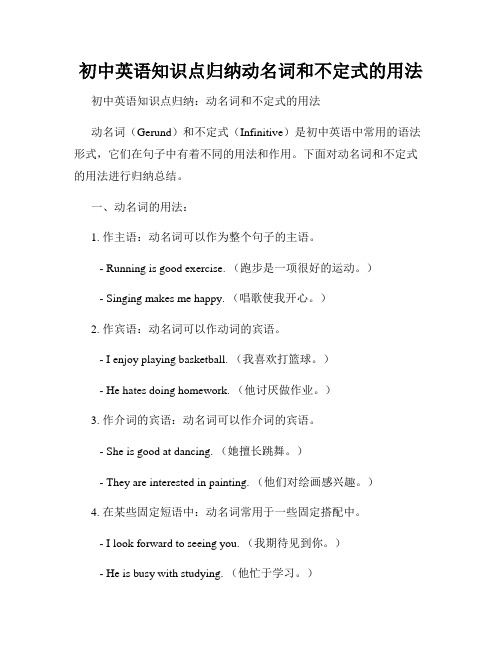
初中英语知识点归纳动名词和不定式的用法初中英语知识点归纳:动名词和不定式的用法动名词(Gerund)和不定式(Infinitive)是初中英语中常用的语法形式,它们在句子中有着不同的用法和作用。
下面对动名词和不定式的用法进行归纳总结。
一、动名词的用法:1. 作主语:动名词可以作为整个句子的主语。
- Running is good exercise. (跑步是一项很好的运动。
)- Singing makes me happy. (唱歌使我开心。
)2. 作宾语:动名词可以作动词的宾语。
- I enjoy playing basketball. (我喜欢打篮球。
)- He hates doing homework. (他讨厌做作业。
)3. 作介词的宾语:动名词可以作介词的宾语。
- She is good at dancing. (她擅长跳舞。
)- They are interested in painting. (他们对绘画感兴趣。
)4. 在某些固定短语中:动名词常用于一些固定搭配中。
- I look forward to seeing you. (我期待见到你。
)- He is busy with studying. (他忙于学习。
)5. 作宾补:动名词可以作及物动词的宾补。
- She found it interesting watching movies. (她认为看电影很有趣。
) - They made her captain of the team. (他们让她成为队长。
)二、不定式的用法:1. 作动词的宾语:不定式可以作动词的宾语。
- I want to study abroad. (我想出国留学。
)- He loves to play the piano. (他喜欢弹钢琴。
)2. 作形容词的定语:不定式可以作名词或代词的定语。
- This is a good book to read. (这是本值得阅读的好书。
初中英语知识点归纳动词的不定式与动名词的用法

初中英语知识点归纳动词的不定式与动名词的用法动词的不定式与动名词是英语中常见的两种动词形式,它们在句子中有各自独特的用法。
本文将对初中英语中动词的不定式与动名词的用法进行归纳总结。
一、动词的不定式的用法1. 不定式作为主语不定式可以作为句子的主语,常用的句型有:- To study English is important.- To succeed needs hard work.- To learn a foreign language is challenging.2. 不定式作为宾语不定式可以作为及物动词的宾语,常用的动词有:- want, hope, plan, decide等。
例如:- She wants to go shopping.- They hope to win the game.- I plan to visit my grandparents next week.3. 不定式作为表语不定式也可以作为句子的表语,常用的句型有:- The best way to learn is to practice.- His dream is to become a doctor.- My goal is to travel around the world.4. 不定式作为状语不定式可以作为状语修饰动词、形容词或副词。
常用的句型有:- I woke up early to catch the train.- She was too tired to continue working.- He spoke slowly to make sure everyone understood.二、动名词的用法1. 动名词作为主语动名词可以作为句子的主语,常用的句型有:- Swimming is my favorite sport.- Reading books is a good way to relax.- Playing basketball requires teamwork.2. 动名词作为宾语动名词可以作为及物动词的宾语,常用的动词有:- enjoy, like, love, hate等。
初中英语动名词和动词不定式归纳
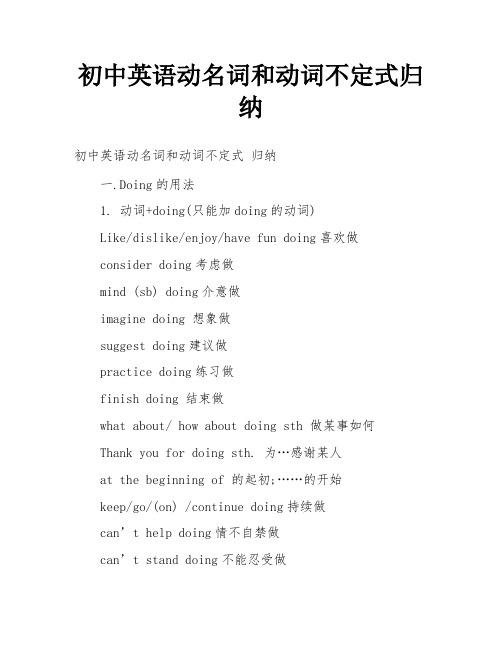
初中英语动名词和动词不定式归纳初中英语动名词和动词不定式归纳一.Doing的用法1. 动词+doing(只能加doing的动词)Like/dislike/enjoy/have fun doing喜欢做consider doing考虑做mind (sb) doing介意做imagine doing 想象做suggest doing建议做practice doing练习做finish doing 结束做what about/ how about doing sth 做某事如何Thank you for doing sth. 为…感谢某人at the beginning of 的起初;……的开始keep/go/(on) /continue doing持续做can’t help doing情不自禁做can’t stand doing不能忍受做feel like doing想要做be busy doing 忙于做某事go +doing (go shopping) 去做某事no +doing禁止做某事be worth doing 值得做be busy doing sth 忙于做某事can’t stop doing sth 忍不住做某事spend time/money (in) doing 花费时间做某事waste time/money (in) doing浪费时间做某事consider doing sth 考虑做某事have trouble/ difficulty/ problems/ experience (in) doing 做某事有困难/有经验used to do 过去常常做某事be /get used for doing sth = be used todo sth.被用来作某事be/get/used to doing 习惯于做某事pay attention to doing 注意做某事hold onto doing sth 坚持做某事look forward to doing期望做某事be interested in doing=take an interest in doing对---感兴趣be good at doing sth= do well in doing sth.擅长作某事about: be worried about doing担忧做be embarrassed about 尴尬做be annoyed about 反感做be pleased with doing对做---满意prefer doing to doing宁愿—也不愿without: without doing没做from:stop sb (from) doing=prevent sb from doing=keep sb from doing阻止……做……(但keep sb doing使某人不停的做)by: by doing通过做二.动词+doing和todo 意义无大区别begin doing/ begin to dostart doing/ start to do开始做continue doing/to do持续做like doing / like to dolove doing / love to do 喜欢做hate doing/ hate to do讨厌做三.动词+doing和todo意义不同forget doing 忘记做过某事forget todo忘记去做某事(还未做)remember doing 记得做过某事remember to do记得要去做某事(还未做)stop doing=give up doing sth 停止做某事stop todo停下来去做另一件事try /tryone’s best to do尽力做need doing需要被做(主语指物)need todo 需要做(主语指人)四.动词+to doagree todo同意做want todo想要做would like to do想要做,愿意做decide to do决定做hope/wish to do希望做plan to do 计划做be supposed to sth =should do sth应该做某事learn todo学会做be /make sure to sth 确定做某事offer todo 主动要求做help (to)do /help sb with sth帮着做afford to do担负得起做refuse to do拒绝做regret to do 遗憾地做dare to do敢做seem to do似乎做promise to do许诺做can\'t wait to do迫不及待做pretend to do假装做used to do过去常常做get to do逐渐做have sth/nothing to do 有某事要做it’s one’sduty to do sth 做某事是某人的责任make up /change one’s mind to do sth.下定/改变某人决心做某事the way to do sth= the way of doing sth 做某方面的方法 . the way to +地方去哪的路其他用法:疑问词+ to dowhen/where/what/how/which/whether…to do形式主语:主语+think/feel/find…it+形容词+for(中性词).+to doit +形容词+of(褒/贬义词).+to dotoo+形容词+to do sth =not enough to do= so thatit takes sb. some time to do sth.be sorry/lucky/happy/glad/pleased to do很抱歉/开心幸运动词+sb.+to doallow sb to do 允许某人做某事get sb. to do 让某人做某事ask sb.to do 让某人做某事tell sb.to do 让某人做某事urge sb to do 争论做某事want/wouldlike sb. to do 想要做某事encourage sb. to do 鼓励某人做某事teach sb.to do 教某人做某事train sb.to do 训练某人做某事advises b. to do 建议做人某事lead sb.to do 领导某人做某事mislead sb. to do误导某人做invitesb. to do 邀请某人做某事expect sb. to do期待某人做remind sb. to do提醒某人做(但remind sb of doing使某人想起做过某事)五.动词+sb. + dosee /watch/hear/feel/noticesb do sth 看见/听见/感觉/注意某人做某事see/watch/hear/feel/notice sb doing sth 看见/听见/感觉/注意某人正在做某事其他不带to的不定式Why not do sth=why don’t do sth 为什么不做某事let sb do sth 让某人做某事make sb do sth 让某人做某事be made to dou sth 被迫做某事had better do最好做would rather do than do宁愿做某事而不厌做某事prefer to do rather than do宁愿做某事而不厌做某事情态动词+do动词原形will/would/can/may/might/must/should/shall+doto表示“的”作定语the key to the door 门的钥匙the key/answer to the question 问题的答案the solution to a problem 问题的解决the way to sp.去某地的路a+形容词+ place to do 一个做某事的地方a ticket to sp. (a ticket for + 比赛名称)一张什么的票句型;It’s time to do sth.It’s time for sth该作某事的时候了.动词做句子的主语,可用动名词ing可用不定式to do,一般用ing。
动词不定式和动名词的用法和区别详解

动词不定式和动名词的用法和区别详解动词不定式是由动词原形加上to构成的形式,通常作为动词、形容词或副词的宾语、补语、定语或状语。
动词不定式可以表示目的、结果、愿望、能力、需要、义务等含义。
动名词是由动词加上-ing构成的形式,可以作为名词的主语、宾语、定语或表语。
动名词通常表示行为或状态的持续性或重复性。
两者的区别如下:1. 形式上的区别:- 动词不定式以to开头,如to eat、to sleep。
- 动名词以-ing结尾,如eating、sleeping。
2. 用法上的区别:- 动词不定式通常用作动词的宾语,如I want to eat。
它可以跟在某些动词后面,如want、like、hope等,构成不定式短语。
- 动名词通常可以用作名词的主语、宾语或表语,如Smokingis bad for health。
3. 意义上的区别:- 动词不定式强调的是动作的目的、结果、愿望、能力等。
例如,I want to learn English。
在这个句子中,不定式to learn强调的是想要研究英语的目的。
- 动名词强调的是动作的持续性或重复性。
例如,I enjoy swimming。
在这个句子中,动名词swimming强调的是游泳这个持续性的动作带来的愉悦感。
需要注意的是,有些动词后既可以接动词不定式,也可以接动名词,但意义可能会有所不同。
例如,I like swimming和I like to swim的意思虽然都是“我喜欢游泳”,但前者强调的是游泳这个动作本身,而后者强调的是我想要做游泳这个动作。
总结起来,动词不定式和动名词在形式、用法和意义上存在一些区别。
了解这些区别有助于我们正确使用它们,并更好地理解英语句子的含义和表达方式。
参考资料:- 李强,牛津英语语法详解,外语教学与研究出版社,2001年。
初中英语知识点归纳动词不定式与动名词的区别
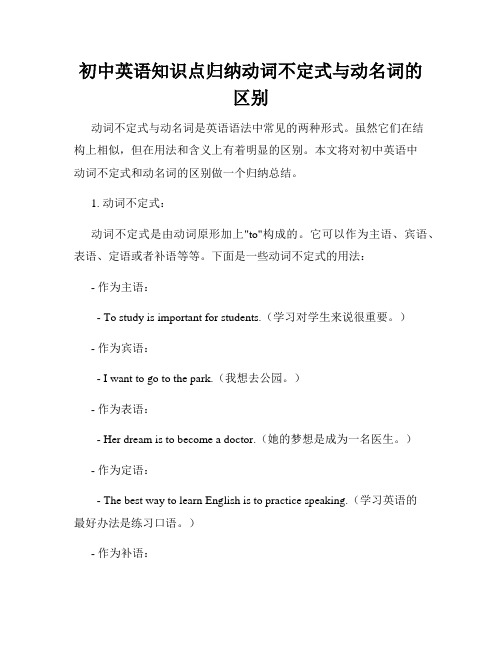
初中英语知识点归纳动词不定式与动名词的区别动词不定式与动名词是英语语法中常见的两种形式。
虽然它们在结构上相似,但在用法和含义上有着明显的区别。
本文将对初中英语中动词不定式和动名词的区别做一个归纳总结。
1. 动词不定式:动词不定式是由动词原形加上"to"构成的。
它可以作为主语、宾语、表语、定语或者补语等等。
下面是一些动词不定式的用法:- 作为主语:- To study is important for students.(学习对学生来说很重要。
)- 作为宾语:- I want to go to the park.(我想去公园。
)- 作为表语:- Her dream is to become a doctor.(她的梦想是成为一名医生。
)- 作为定语:- The best way to learn English is to practice speaking.(学习英语的最好办法是练习口语。
)- 作为补语:- He made her laugh.(他逗她笑了。
)2. 动名词:动名词是由动词加上"-ing"构成的名词形式,它可以作为主语、宾语、定语、表语或者补语等等。
下面是一些动名词的用法:- 作为主语:- Swimming is my favorite sport.(游泳是我最喜欢的运动。
)- 作为宾语:- I enjoy playing basketball.(我喜欢打篮球。
)- 作为定语:- The running water is very clear.(流动的水非常清澈。
)- 作为表语:- Her hobby is painting.(她的爱好是绘画。
)- 作为补语:- She kept him waiting for hours.(她让他等了几个小时。
)3. 区别总结:- 不定式通常表达一个动作的整体概念,而动名词通常表示正在进行或持续的动作。
- 不定式前面可以有情态动词或助动词,而动名词则不能。
中考英语 动词不定式和动名词的用法记忆口诀

动词不定式和动名词的用法记忆口诀一、英语动词不定式用法顺口溜:①不定式有标记,to与动词连一起。
②没有人称数变化,动词特点它具备。
③主宾定状表补语,唯独作谓不可以。
④not 加上不定式,否定结构要牢记。
⑤疑问词与不定式,构成短语有意义。
⑥仔细推敲多思考,准确判断有依据。
解析:①“to+动词原形”是它的基本构成形式,即不定式的标记。
②它没有人称和数的变化,不管主语是任何人称,单数还是复数,动词不定式都没有变化。
但它仍保留动词的特点,可以有自己的宾语或状语。
③它具有名词、形容词和副词三大特点,所以,它在句中可以作主语、宾语、定语、表语、状语和宾补。
④“not +动词不定式”是它的否定形式,不要受其他否定式的影响,要记住规律。
⑤疑问代词what, who, whom, which和疑问副词where, when, why , how加上不定式在句中可以做主语,宾语、表语、状语。
⑥通过以上分析,只要仔细研究,把不定式的功能用法搞清楚,在应用时就能作出准确的判断。
二、哪些动词后面只能接动词不定式,下面的顺口溜有助于记忆:同意提出做计划agree, offer, intend/plan要求答应来帮忙demand/ask, promise, help准确决定遭拒绝prepare, decide, refuse敢于选择有希望dare, choose, wish/hope/want/expect不能做到莫假装fail, pretend设法做成决心坚manage, determine三、省略to的动词不定式的口诀:一感:feel;二听:hear, listen to;三让:make, let, have;四看:see, notice, watch, observe;半帮助:help四、英语动名词用法顺口溜:动名词很特别,两种时态和语态;一般和完成,都可变被动。
动名两特点,有名也有动。
否定结构很好变,动名前面not添。
初中英语动词不定式和动名词全面归纳
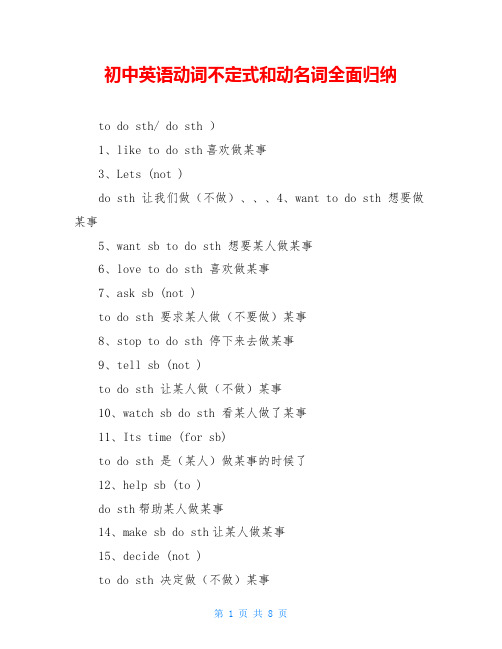
初中英语动词不定式和动名词全面归纳to do sth/ do sth )1、like to do sth喜欢做某事3、Lets (not )do sth 让我们做(不做)、、、4、want to do sth 想要做某事5、want sb to do sth 想要某人做某事6、love to do sth 喜欢做某事7、ask sb (not )to do sth 要求某人做(不要做)某事8、stop to do sth 停下来去做某事9、tell sb (not )to do sth 让某人做(不做)某事10、watch sb do sth 看某人做了某事11、Its time (for sb)to do sth 是(某人)做某事的时候了12、help sb (to )do sth帮助某人做某事14、make sb do sth让某人做某事15、decide (not )to do sth 决定做(不做)某事16、find it +adj + to do sth发现做某事是、、、、的17、have to do sth 不得不做某事18、try (not )to do sth 试图(不)去做某事19、try ones best to do sth 尽某人最大的努力去做某事20、Its +adj +(for)of +sb + to do sth 对某人来说做某事是、、、的21、plan to do sth 计划做某事22、S、p、+be a good place to do sth 某地是、、、的好地点23、It takes sb +some time + to do sth 某人花费多少时间做某事24、send sb to do sth派某人去做某事25、invite sb to do sth 邀请某人去做某事26、forget to do sth 忘记做某事28、be able to do sth 能够做某事30、seem to do sth 似乎做某事32、疑问词+ to do sth33、need sth to do sth 需要某物做某事34、use sth to do sth 使用某物做某事35、follow sb to sth 跟随某人做某事36、need to do sth 需要做某事37、a good time to do sth 做某事的好时间38、the best time to do sth做某事的最佳时间39、the best way to do sth 做某事的最好的方法40、be the first / last one to do sth第一个/最后一个做某事的人41、would like to do sth 想要做某事42、be excited /surprised to do sth 做某事很兴奋/吃惊43、be useful to do sth 、、、、对于做某事是有用的44、be allowed to do sth 被允许/可以做某事45、allow sb to do sth 允许某人做某事46、Its better to do sth 最好做某事47、Its best to do sth 做某事棒极了48、take care (not)to do sth 注意要(不要)做某事49、see sb do sth看见某人做了某事50、why not do sth ?为什么不做某事呢?51、have enough time to do sth 有足够的时间做某事52、too… to do sth 太、、、而不能做、、、、53、not… enough to do sth 不是足够、、、而不能、、、54、encourage sb to do sth 鼓励某人做某事55、choose to sth 选择做某事56、wait to do sth 等待做某事57、be happy/glad/pleased to do sth 做某事很高兴58、make it +adj + to do sth 让做某事、、、59、be careful to do sth谨慎做某事60、be afraid to do sth 害怕做某事61、Its our duty to do sth 做某事是我们的责任62、used to do sth 过去常常做某事64、make a decision to do sth 做决定做某事65、have an opportunity to do sth 有机会做某事66、wait for sb to do sth 等待某人做某事67、would do sth rather than do sth 宁愿做、、、而不愿做、、、68、would rather do sth than do sth 比起做、、、更愿意做、、、69、hurry to do sth 匆忙做某事70、refuse to do sth 拒绝做某事71、agree to do sth 同意做某事72、pretend to do sth 假装做某事73、pretend to be doing sth 假装正在做某事74、prefer to do sth 更喜欢做某事75、prefer not to do sth 更不喜欢做某事76、prefer to do sth raher than do sth 比起做、、、更喜欢做、、、77、be willing to do sth 情愿做某事78、volunteer +时间/ 钱 + to do sth 自愿花时间/钱去做某事79、volunteer to do sth 自愿做某事80、offer to do sth 提出要做某事81、rush to do sth 赶着去做某事82、in order (not )to do sth为了(不)做某事83、be certain to do sth 一定会做某事84、be sure to do sth 务必做某事85、make plans to do sth 制定计划做某事86、go out of their way to do sth 花尽心思去做某事87、lead sb to do sth 带领某人做某事88、Its ones job to do sth 做某事是某人分内的事89、Its ones turn to do sth 轮到某人做某事90、urge sb to do sth 强烈要求某人做某事91、Could /Would you please (not)do sth ? 你能不能(不)做某事?92、be supposed to do sth=should do sth 应该做某事93、warn sb to do sth 警告某人做某事二、接动名词(doing sth )1、like doing sth 喜欢做某事2、enjoy doing sth 很喜欢做某事3、have fun doing sth 做某事很愉快4、be interested in doing sth 对做某事感兴趣5、Thanks for doing sth 感谢做、、、7、stop sb doing sth 阻止某人做某事8、stop sb from doing sth阻止某人做某事9、go + v-ing 去、、、10、do the (some )+v-ing 你懂的,不解释11、What/How doing sth ? 做、、、怎么样?12、practice doing sth 练习做某事13、watch sb doing sth 看见某人正在做某事14、find sb doing sth 发现某人做着做某事15、mind (ones )doing sth 介意(某人)做某事16、cant stand doing sth不能忍受做某事17、think about doing sth 考虑做某事18、spend … (in)doing sth 做某事花费、、、19、finish doing sth 完成做、、、、20、be busy doing sth 忙于做某事21、keep doing sth 继续做某事22、keep sb from doing sth 阻止某人做某事23、keep sb doing sth 让某人一直做某事24、be good at doing sth 擅长做某事25、hate doing sth 讨厌做某事26、There be +名词+doing sth 有、、、正在做某事27、make a living by doing sth 通过做、、、谋生28、have a difficult time doing sth 做某事很艰苦29、feel like doing sth 想要做某事32、by doing sth 通过做某事33、end up doing sth 以做某事结束34、do a survey about doing sth 对做某事做个调查35、be afraid of doing sth 害怕做某事36、be used to doing sth 习惯于做某事37、be terrified of doing sth 害怕做某事38、give up doing sth 放弃做某事39、instead of doing sth 反而做了某事40、have nothing against doing sth 不反对做某事41、be serious about doing sth 对于做某事时认真的42、have a chance of doing sth 有机会做某事43、before/ when /while +doing sth44、start doing sth 开始做某事45、have a lot of experience doing sth对做某事有很多经验46、prefer doing sth 更喜欢做某事47、consider doing sth 考虑做某事48、dream of / about doing sth 梦想做某事49、continue doing sth 继续做某事50、put off doing sth 推迟做某事51、be used for doing sth =be used to do sth、、是被来做某事的52、prefer doing sth to doing sth 比起做、、、更喜欢做、、、53、without doing sth 没有做、、、、54、be comfortable doing sth 做某事很舒服55、cant stop/help doing sth 忍不住做某事56、look forward to doing sth 期待做某事57、be against doing sth 反对做某事58、have trouble/problems/difficulty (in)doing sth 做某事有困难59、suggest doing sth 建议做某事60、be busy doing sth 忙于做某事61、be worth doing sth值得做某事。
初中英语知识归纳动词的不定式和动名词
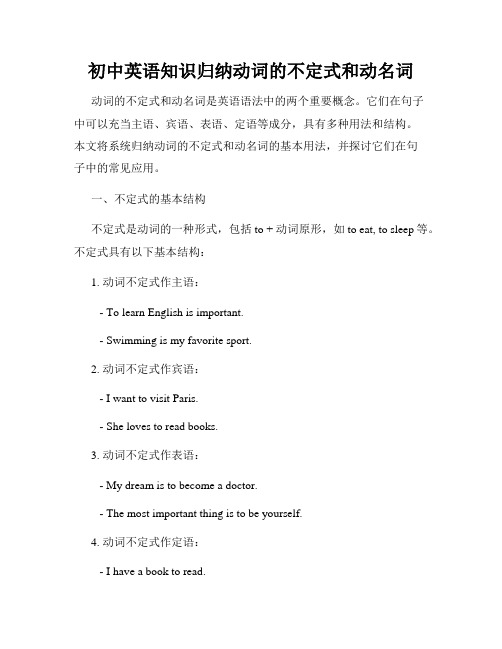
初中英语知识归纳动词的不定式和动名词动词的不定式和动名词是英语语法中的两个重要概念。
它们在句子中可以充当主语、宾语、表语、定语等成分,具有多种用法和结构。
本文将系统归纳动词的不定式和动名词的基本用法,并探讨它们在句子中的常见应用。
一、不定式的基本结构不定式是动词的一种形式,包括to + 动词原形,如to eat, to sleep等。
不定式具有以下基本结构:1. 动词不定式作主语:- To learn English is important.- Swimming is my favorite sport.2. 动词不定式作宾语:- I want to visit Paris.- She loves to read books.3. 动词不定式作表语:- My dream is to become a doctor.- The most important thing is to be yourself.4. 动词不定式作定语:- I have a book to read.- We need a place to live.二、动词不定式的常见用法1. 表示目的和意图:- I study hard to pass the exam.- He exercises regularly to stay healthy.2. 接在情态动词后,表示推测、推理:- He must be asleep.- They may have left already.3. 与一些动词连用,构成特定短语或习惯搭配:- Try to do something.- Want to do something.- Need to do something.4. 与某些动词连用,构成复合宾语:- I saw him leave the room.- She heard the baby cry.三、动名词的基本结构动名词是动词的一种形式,在句中作名词用。
动词不定式与动名词的区别与用法比较动词不定式与动名词的语法结构与用法
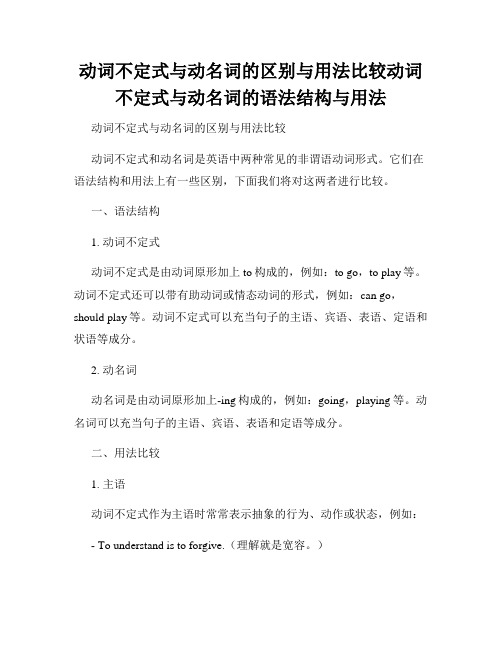
动词不定式与动名词的区别与用法比较动词不定式与动名词的语法结构与用法动词不定式与动名词的区别与用法比较动词不定式和动名词是英语中两种常见的非谓语动词形式。
它们在语法结构和用法上有一些区别,下面我们将对这两者进行比较。
一、语法结构1. 动词不定式动词不定式是由动词原形加上to构成的,例如:to go,to play等。
动词不定式还可以带有助动词或情态动词的形式,例如:can go,should play等。
动词不定式可以充当句子的主语、宾语、表语、定语和状语等成分。
2. 动名词动名词是由动词原形加上-ing构成的,例如:going,playing等。
动名词可以充当句子的主语、宾语、表语和定语等成分。
二、用法比较1. 主语动词不定式作为主语时常常表示抽象的行为、动作或状态,例如:- To understand is to forgive.(理解就是宽容。
)- To love someone is to accept them for who they are.(爱一个人就是接受他们的真实面貌。
)动名词作为主语时常常表示一般的、具体的动作或状态,例如:- Swimming is good for health.(游泳对健康有好处。
)- Eating too much junk food can lead to health problems.(吃太多垃圾食品会导致健康问题。
)2. 宾语动词不定式作为及物动词的宾语时,在一些动词后面常常跟上动词不定式,例如:- I want to go shopping.(我想去购物。
)- She loves to sing.(她喜欢唱歌。
)动名词作为宾语时,常常跟动词之后,例如:- I enjoy swimming in the sea.(我喜欢在海里游泳。
)- They avoid talking about the problem.(他们避免谈论这个问题。
)3. 表语动词不定式作为表语时,常常表示主语的性质、身份、目的等,例如:- His dream is to become a famous singer.(他的梦想是成为一名著名的歌手。
初中英语动词不定式和动名词全面归纳
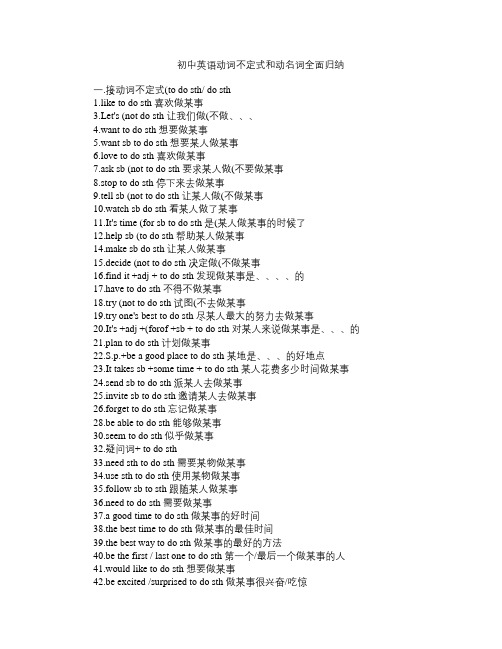
初中英语动词不定式和动名词全面归纳一.接动词不定式(to do sth/ do sth1.like to do sth 喜欢做某事3.Let's (not do sth 让我们做(不做、、、4.want to do sth 想要做某事5.want sb to do sth 想要某人做某事6.love to do sth 喜欢做某事7.ask sb (not to do sth 要求某人做(不要做某事8.stop to do sth 停下来去做某事9.tell sb (not to do sth 让某人做(不做某事10.watch sb do sth 看某人做了某事11.It's time (for sb to do sth 是(某人做某事的时候了12.help sb (to do sth 帮助某人做某事14.make sb do sth 让某人做某事15.decide (not to do sth 决定做(不做某事16.find it +adj + to do sth 发现做某事是、、、、的17.have to do sth 不得不做某事18.try (not to do sth 试图(不去做某事19.try one's best to do sth 尽某人最大的努力去做某事20.It's +adj +(forof +sb + to do sth 对某人来说做某事是、、、的21.plan to do sth 计划做某事22.S.p.+be a good place to do sth 某地是、、、的好地点23.It takes sb +some time + to do sth 某人花费多少时间做某事24.send sb to do sth 派某人去做某事25.invite sb to do sth 邀请某人去做某事26.forget to do sth 忘记做某事28.be able to do sth 能够做某事30.seem to do sth 似乎做某事32.疑问词+ to do sth33.need sth to do sth 需要某物做某事e sth to do sth 使用某物做某事35.follow sb to sth 跟随某人做某事36.need to do sth 需要做某事37.a good time to do sth 做某事的好时间38.the best time to do sth 做某事的最佳时间39.the best way to do sth 做某事的最好的方法40.be the first / last one to do sth 第一个/最后一个做某事的人41.would like to do sth 想要做某事42.be excited /surprised to do sth 做某事很兴奋/吃惊43.be useful to do sth 、、、、对于做某事是有用的44.be allowed to do sth 被允许/可以做某事45.allow sb to do sth 允许某人做某事46.It's better to do sth 最好做某事47.It's best to do sth 做某事棒极了48.take care (not to do sth 注意要(不要做某事49.see sb do sth 看见某人做了某事50.why not do sth ?为什么不做某事呢?51.have enough time to do sth 有足够的时间做某事52.too… to do sth太、、、而不能做、、、、53.not… enough to do sth不是足够、、、而不能、、、54.encourage sb to do sth 鼓励某人做某事55.choose to sth 选择做某事56.wait to do sth 等待做某事57.be happy/glad/pleased to do sth 做某事很高兴58.make it +adj + to do sth 让做某事、、、59.be careful to do sth 谨慎做某事60.be afraid to do sth 害怕做某事61.It's our duty to do sth 做某事是我们的责任ed to do sth 过去常常做某事64.make a decision to do sth 做决定做某事65.have an opportunity to do sth 有机会做某事66.wait for sb to do sth 等待某人做某事67.would do sth rather than do sth 宁愿做、、、而不愿做、、、68.would rather do sth than do sth 比起做、、、更愿意做、、、69.hurry to do sth 匆忙做某事70.refuse to do sth 拒绝做某事71.agree to do sth 同意做某事72.pretend to do sth 假装做某事73.pretend to be doing sth 假装正在做某事74.prefer to do sth 更喜欢做某事75.prefer not to do sth 更不喜欢做某事76.prefer to do sth raher than do sth 比起做、、、更喜欢做、、、77.be willing to do sth 情愿做某事78.volunteer +时间/ 钱+ to do sth 自愿花时间/钱去做某事79.volunteer to do sth 自愿做某事80.offer to do sth 提出要做某事81.rush to do sth 赶着去做某事82.in order (not to do sth 为了(不做某事83.be certain to do sth 一定会做某事84.be sure to do sth 务必做某事85.make plans to do sth 制定计划做某事86.go out of their way to do sth 花尽心思去做某事87.lead sb to do sth 带领某人做某事88.It's one's job to do sth 做某事是某人分内的事89.It's one's turn to do sth 轮到某人做某事90.urge sb to do sth 强烈要求某人做某事91.Could /Would you please (not do sth ? 你能不能(不做某事?92.be supposed to do sth=should do sth 应该做某事93.warn sb to do sth 警告某人做某事二、接动名词(doing sth1.like doing sth 喜欢做某事2.enjoy doing sth 很喜欢做某事3.have fun doing sth 做某事很愉快4.be interested in doing sth 对做某事感兴趣5.Thanks for doing sth 感谢做、、、7.stop sb doing sth 阻止某人做某事8.stop sb from doing sth阻止某人做某事9.go + v-ing 去、、、10.do the (some +v-ing 你懂的,不解释11.What/How doing sth ? 做、、、怎么样?12.practice doing sth 练习做某事13.watch sb doing sth 看见某人正在做某事14.find sb doing sth 发现某人做着做某事15.mind (one's doing sth 介意(某人做某事16.can't stand doing sth不能忍受做某事17.think about doing sth 考虑做某事18.spend … (indoin g sth 做某事花费、、、19.finish doing sth 完成做、、、、20.be busy doing sth 忙于做某事21.keep doing sth 继续做某事 22.keep sb from doing sth 阻止某人做某事 23.keep sb doing sth 让某人一直做某事 24.be good at doing sth 擅长做某事 25.hate doing sth 讨厌做某事 26.There be +名词+doing sth 有、、正在做某事、 27.make a living by doing sth 通过做、、谋生、 28.have a difficult time doing sth 做某事很艰苦 29.feel like doing sth 想要做某事 32.by doing sth 通过做某事 33.end up doing sth 以做某事结束 34.do a survey about doing sth 对做某事做个调查 35.be afraid of doing sth 害怕做某事 36.be used to doing sth 习惯于做某事 37.be terrified of doing sth 害怕做某事38.give up doing sth 放弃做某事 39.instead of doing sth 反而做了某事不反对做某事40.have nothing against doing sth 41.be serious about doing sth 对于做某事时认真的42.have a chance of doing sth 有机会做某事 43.before/ when /while +doing sth 44.start doing sth 开始做某事45.have a lot of experience doing sth 对做某事有很多经验 46.prefer doing sth 更喜欢做某事 47.consider doing sth 考虑做某事 48.dream of / about doing sth 梦想做某事 49.continue doing sth 继续做某事 50.put off doing sth 推迟做某事 51.be used for doing sth =be used to do sth、、是被来做某事的 52.prefer doing sth to doing sth 比起做、、更喜欢做、、、、 53.without doing sth 没有做、、、、 54.be comfortable doing sth 做某事很舒服 55.can't stop/help doing sth 忍不住做某事 56.look forward to doing sth 期待做某事 57.be against doing sth 反对做某事 58.havetrouble/problems/difficulty (in doing sth 做某事有困难 59.suggest doing sth 建议做某事 60.be busy doing sth 忙于做某事 61.be worth doing sth 值得做某事。
初中英语知识点归纳动词的不定式和动名词用法
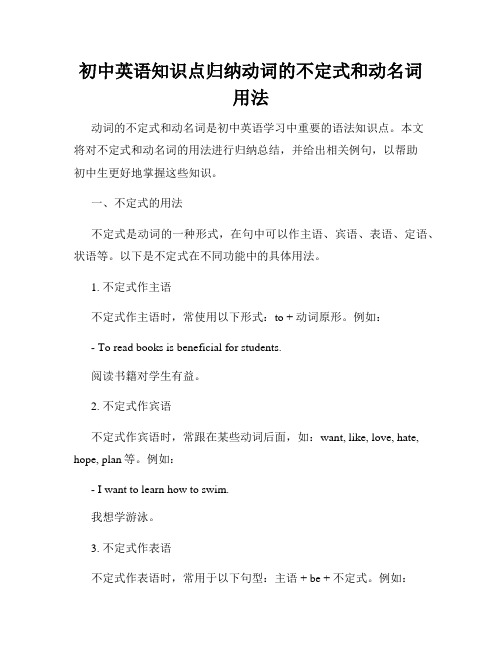
初中英语知识点归纳动词的不定式和动名词用法动词的不定式和动名词是初中英语学习中重要的语法知识点。
本文将对不定式和动名词的用法进行归纳总结,并给出相关例句,以帮助初中生更好地掌握这些知识。
一、不定式的用法不定式是动词的一种形式,在句中可以作主语、宾语、表语、定语、状语等。
以下是不定式在不同功能中的具体用法。
1. 不定式作主语不定式作主语时,常使用以下形式:to + 动词原形。
例如:- To read books is beneficial for students.阅读书籍对学生有益。
2. 不定式作宾语不定式作宾语时,常跟在某些动词后面,如:want, like, love, hate, hope, plan等。
例如:- I want to learn how to swim.我想学游泳。
3. 不定式作表语不定式作表语时,常用于以下句型:主语 + be + 不定式。
例如:- His dream is to become a doctor.他的梦想是成为一名医生。
4. 不定式作定语不定式可以作为名词的定语,放在名词前面修饰名词。
例如:- She has a book to read.她有一本可供阅读的书。
5. 不定式作状语不定式可以作时间、目的、原因、结果、伴随等状语。
例如:- She went to the store to buy some groceries.她去商店购买一些食品杂货。
二、动名词的用法动名词是将动词变为名词形式,以-ing结尾。
动名词可以作主语、宾语、表语、定语和状语等。
以下是动名词在不同功能中的具体用法。
1. 动名词作主语动名词作主语时,可以使用以下句型:动名词 + 动词。
例如:- Swimming is my favorite sport.游泳是我最喜欢的运动。
2. 动名词作宾语动名词可以作动词后面的宾语,也可以作介词后面的宾语。
例如:- I enjoy playing soccer.我喜欢踢足球。
- 1、下载文档前请自行甄别文档内容的完整性,平台不提供额外的编辑、内容补充、找答案等附加服务。
- 2、"仅部分预览"的文档,不可在线预览部分如存在完整性等问题,可反馈申请退款(可完整预览的文档不适用该条件!)。
- 3、如文档侵犯您的权益,请联系客服反馈,我们会尽快为您处理(人工客服工作时间:9:00-18:30)。
1. 动词+doing(只能加doing 的动词) Like/dislike/enjoy/have fun +doing 喜欢做 mind (sb) doing 介意做 imagine doing 想象做 suggest doing 建议做 practice doing 练习做 finish doing 结束做 what about/ how about doing sth 做某事如何 Thank you for doing sth. 为…感谢某人 at the beginning of 的起初;……的开始 keep/go (on) /continue doing 持续做 can’t help doing 情不自禁做 can’t stand doing 不能忍受做 can’t stop doing sth 忍不住做某事 feel like doing 想要做 go +doing (go shopping) 去做某事 no +doing 禁止做某事 be worth doing 值得做 be busy doing sth 忙于做某事 spend time/money (in) doing 花费时间做某事 waste time/money (in) doing 浪费时间做某事 consider doing sth 考虑做某事 have trouble/difficulty/problems/experience (in) doing 做某事有困难/有经验 used to do 过去常常做某事 be /get used for doing sth = be used to do sth. 被用来作某事 be /get/used to doing 习惯于做某事 pay attention to doing 注意做某事 hold on to doing sth 坚持做某事 look forward to doing 期望做某事 be interested in doing =take an interest in doing 对---感兴趣 be good at doing sth= do well in doing sth. 擅长作某事 about: be worried about doing 担忧做 be embarrassed about doing 尴尬做 be annoyed about doing 反感做 with: be pleased with doing 对做---满意 prefer doing to doing 宁愿—也不愿 without: without doing 没做 from: stop sb (from) doing =prevent sb from doing =keep sb from doing (但keep sb doing 使某人不停的做) by: by doing 通过做 222. 动词+doing 和to do 意义无大区别begin doing/ begin to do start doing/ start to do 开始做 continue doing/to do 持续做 like doing / like to do love doing / love to do 喜欢做 hate doing/ hate to do 讨厌做 3 3. 动词+doing 和to do 意义不同 forget doing 忘记做过某事 forget to do 忘记去做某事(还未做) remember doing 记得做过某事 remember to do 记得要去做某事(还未做) stop doing=give up doing sth 停止做某事 stop to do 停下来去做另一件事 try /try one’s best to do 尽力做 need doing 需要被做(主语指物) need to do 需要做(主语指人) 4. 动词+to do agree to do 同意做 want to do 想要做 would like to do 想要做,愿意做 decide to do 决定做 hope/ wish to do 希望做 plan to do 计划做 be supposed to do sth =should do sth 应该做某事 learn to do 学会做 be /make sure to do sth 确定做某事 offer to do 主动要求做 help (to) do /help sb with sth 帮着做 afford to do 担负得起做 refuse to do 拒绝做 regret to do 遗憾地做 dare to do 敢做 seem to do 似乎做 promise to do 许诺做 can’t wait to do 迫不及待做 pretend to do 假装做 used to do 过去常常做 get to do 逐渐做 have sth /nothing to do 有某事要做 it’s one’s duty to do sth 做某事是某人的责任 make up /change one’s mind to do sth. 下定/改变 某人决心做某事 the way to do sth = the way of doing sth 做某事的方法 the way to +地方 去哪的路其他用法:疑问词+ to dowhen/where/what/how/whi ch/whether…to do形式主语:sb+think/feel/find…it+形容词+ to doIt is +形容词+of/for sb.+ to dotoo+形容词+to do sth =not enough to do= so thatit takes sb. some time to do sth.be sorry/lucky/ happy/glad/pleased to do很抱歉/开心幸运动词+sb.+ to doallow sb to do 允许某人做某事get sb. to do 让某人做某事ask sb. to do 让某人做某事tell sb. to do 让某人做某事urge sb to do 争论做某事want/would like sb. to do 想要做某事encourage sb. to do 鼓励某人做某事teach sb. to do 教某人做某事train sb. to do 训练某人做某事advise sb. to do 建议做人某事lead sb. to do 领导某人做某事mislead sb. to do误导某人做invite sb. to do 邀请某人做某事expect sb. to do期待某人做remind sb. to do提醒某人做(但remind sb of doing使某人想起做过某事)5. 动词+sb. + dosee /watch/hear/feel/notice sb do sth 看见/听见/感觉/注意某人做某事see /watch/hear/feel/notice sb doing sth 看见/听见/感觉/注意某人正在做某事其他不带to的不定式Why n ot do sth=why don’t you do sth为什么不做某事let sb do sth 让某人做某事make sb do sth 让某人做某事be made to do sth 被迫做某事had better do最好做would rather do than do宁愿做某事而不厌做某事prefer to do rather than do宁愿做某事而不厌做某事情态动词+动词原形will/would/can/may/might/must/should/shall+do6. to表示“的”the key to the door 门的钥匙the key/answer to the question 问题的答案the solution to a problem 问题的解决the way to sp.去某地的路a +形容词+ place to do 一个做某事的地方a ticket to sp. (a ticket for + 比赛名称)一张什么的票句型;It’s time to do sth. It’s time for sth该作某事的时候了.动词做句子的主语,可用动名词ing可用不定式to do,一般用ing。
另:不定式做主语大多表示将来表目的。
祈使句肯定句全用动词原形开头;Open the door, please.Keep quiet.否定用Don’t +do原形开头Don’t sleep/speak.So +be/助动词/情态动词+ 主语‘也一样’--She is a student.-- So am I.So +主语+be/助动词/ 情态动词‘确实如此’_-My sister likes eating apples.-So she does.Neither/nor + be /助动词/ 情态动词+主语…也不一样(用于否定句)--He is a worker.--Neither /nor/me“出什么毛病了”What’s the matter trouble /with…?=What’s wrong with…? =What’s up?What happens to…? 发生于某人身上名词或代词作主语时和谓语之间的单复数的一致问题:1、谓语和谓语基本保持单复数的一致,即:主语是可数名词单数或不可数名词时,谓语动词用单数形式:如:The computer was a great invention.(计算机是个了不起的发明)The water in the glass is very cold.(玻璃杯里的水很冷)2、集体名词(如family, class, team, group, row, police, school等)做句子主语时,如果表示整体概念,则谓语用单数形式,如:Class Three is a very good class.(三班是好班)如果表示其中的所有成员时,则谓语用复数形式,如:Class Three have a map of China.(三班有张中国地图)3、Chinese, Japanese, fish, sheep, people等表示单个时谓语用单数,表示许多时,谓语用复数。
如:There is a sheep in the yard.(院子里有只绵羊) / There are some sheep in the yard.(院子里有一些绵羊)4、maths, news等虽然有s结尾,但不是复数,因此谓语仍用单数:The news is very exciting. (这个消息令人兴奋)5、glasses, shoes, socks, trousers, gloves等名词往往用复数形式,故谓语用复数。
